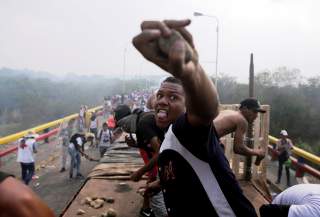What’s Next for Venezuela?
The citizens of Caracas face unpleasant choices.
Scenes of destruction and despair were on full display worldwide over the weekend as the Maduro regime used force to deny entry into Venezuela of desperately needed humanitarian assistance, leading to increasing speculation about what comes next. Or, rather, will the United States invade Venezuela to topple the despotic regime that has ruined Latin America’s once-wealthiest economy and created Latin America’s worst humanitarian crisis in many years.
The threat of invasion has increasingly been implied, with senior U.S. administration officials suggesting routinely that “all options are on the table.” Indeed, they are, as they always are in the conduct of foreign affairs. But the implication is clearly that if Maduro and his inner circle refuse to depart, then the use of force may be employed.
Maduro plainly needs to go. His mandate as president expired on January 10, 2019, at which point he re-inaugurated himself based on the results of a clearly fraudulent election in May 2018. According to Venezuela’s constitution—a document instituted under Hugo Chavez, the founder of the so-called Bolivarian Revolution and Maduro’s political godfather—in the absence of a president the head of the National Assembly becomes the interim president and is then obligated to call for new elections. Under this scenario, Juan Guaido, the newly-installed, thirty-five-year-old head of the National Assembly, became the constitutional leader of Venezuela. The United States, the Lima Group of Latin American nations and Canada, European nations, Japan, and numerous others have now recognized Guaido as the legitimate, albeit interim, leader of Venezuela.
Over the past six years of Maduro’s misrule, Venezuela has become a humanitarian disaster. Fully 10 percent of the population has fled due to lack of food and healthcare, hyperinflation, and out of control crime. National oil company PDVSA, the life-blood of the economy, has been politicized and corrupted, and production is falling rapidly. The educational system has been fully coopted by Chavismo, and every institution of the state except the National Assembly has been bent to the will of the executive. Venezuela’s sovereignty has been sold cheaply to Cuba, which has thoroughly infiltrated the security services and state functions, and sweetheart deals have been cut to provide Venezuela’s national patrimony—oil—to China, Russia, and others in exchange for short term financing and support. In short, Chavismo has mortgaged Venezuela’s future. Interim president Guiado himself has obliquely called for an armed international response.
As bad as the situation continues to get in Venezuela, however, an armed response is unlikely. First of all, there is no casus belli that would justify a U.S.-led invasion. Nor is there a mandate from the United Nations or OAS. The doctrine of Responsibility to Protect is not sufficiently developed or accepted at this point, and circumstances do not yet justify its application to Venezuela in any event. Latin American nations, including those that support strong actions against Maduro, have publicly indicated little support for armed intervention, and, despite the rhetoric, there does not appear to be much enthusiasm in Washington for such a step.
In particular, while the U.S. military would be able to decapitate the Maduro regime and install Guaido in the Miraflores Palace without significant exertion, the aftermath of such action would be messy. Venezuela is a large country, much of it rural or jungled, and numerous non-state actors occupy large portions of the nation, from regime-sponsored goon squads, to FARC and ELN guerrillas seeking safe haven from Colombia, to illegal goldminers and wildcatters, to drug traffickers and common criminals and highwaymen. Invasion would be relatively easy; pacification could be complicated. Of course, with invasion would also come the responsibility to lead recovery efforts and shoulder the blame if such efforts did not lead to desired results. Within the context of administration efforts to deal with China and North Korea and Iran, pass the trade agreement with Canada and Mexico, address domestic issues including the economy, border enforcement, and the activities of the Special Counsel, an invasion of Venezuela is not necessarily high on the priorities list.
What can be anticipated, however, is that there will be further intensified pressure on the regime, which will squeeze it like the large anacondas that inhabit Venezuelan waters. In addition to efforts to entice regime officials, including the military, to shift their loyalty from Maduro to Guaido, the United States, in coordination with other nations, looks to amplify asset seizure and forfeiture. Collectively, they aim to deny new and cancel existing visas for regime officials and their families, thus forcing departures from the United States, Europe, and Latin American nations that host them, and increase humanitarian assistance. All of these activities will further the goal of turning Maduro into an international pariah, and, it is hoped, create conditions that will ultimately see him turfed from office.
The key is to keep the Maduro regime on the defensive. There are no guarantees, and nobody can say when the dam will ultimately break—or if it will break. Meanwhile, Venezuelans face an unpleasant choice between protesting and exposing themselves to the excesses of the regime, hunkering down, or joining the millions of Venezuelans who have already left their nation behind. It is a tragedy lain squarely at the feet of Chavismo.
Eric Farnsworth heads the Washington office of the Americas Society/Council of the Americas. He served at the State Department, USTR and the White House. He was a senior adviser in the office of the special envoy for the Americas from 1995 to 1998.
Image: Reuters

